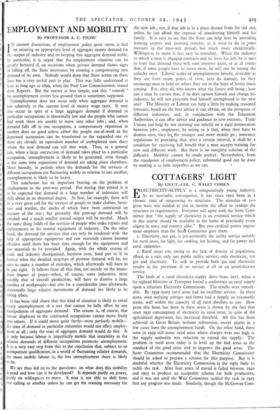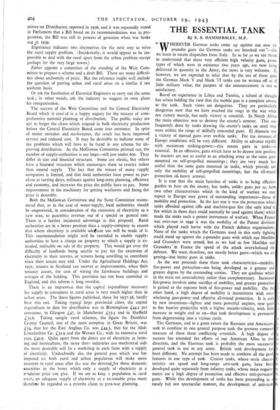COTTAGERS' LIGHT
By LIEUT.-COL. C. WALEY COHEN ELECTRICITY-SUPPLY is a comparatively young industry. As an inevitable consequence, it has since 1910 been in a chronic state of outgrowing its structure. The stimulus of two great wars was needed to put in motion the effort to readapt the structure to requirements. Everyone will agree with the Scott Com- mittee that " the supply of electricity is an essential service which in due course should be available in the home of practically every citizen in town and country alike." But two cardinal points require more emphasis than the Scat Committee gave them.
x. Electricity, not gas, is pre-eminently the utility service suitable for rural areas, for light, for cooking, for heating, and for power and rural industries.
2. Rural areas can, owing to the lack of density of population, afford, as a rule, only one public utility service; only electricity, not gas and electricity. To seek to provide both gas and electricity results in the provision of no service at all or an unsatisfactory service.
The birth of a rural electricity-supply dates from 1927, when a far-sighted Minister of Transport forced a conference on rural supply upon a reluctant Electricity Commission. The results were remark- able. By 1939 many rural areas had an excellent service. In these areas, even outlying cottages and farms had a Supply on reasonable terms, well within the capacity of all rural dwellers to pay. How great this boon has been in these areas is shown by the fact that since 1931 consumption of electricity in rural areas, in spite of the agricultural depression, has increased threefold. All this has been achieved in Great Britain without subvention, except grants in a few cases from the unemployment funds. On the other hand, there were in 1939 still many rural areas where charges were too high or the supply authority was reluctant to extend the supply. The problem in rural areas today is to level up the bad areas to the standard of the good areas and to improve the good areas. The Scott Committee recommended that the Electricity Commission should be asked to prepare a scheme for this purpose. But it is doubtful whether the Electricity Commission is the right body to tackle the task. After four years of travail it failed between 192o and 1925 to produce an acceptable scheme for bulk production, and it was not until the Weir Committee tackled the task in 1925 that any progress was made. Similarly, though the McGowan Com-
mittee on Distribution reported in 1936, and it was repeatedly stated in Parliament that a Bill based on its recommendations was in pre- paration, the Bill was still in process of gestation when war broke out in 1939.
Experience indicates two alternatives for the next step to solve the rural supply problem. (Incidentally, it would appear to be im- possible to deal with the rural apart from the urban problem except perhaps for the very large towns.)
Either appoint a committee of the standing of the Weir Com- mittee to prepare a scheme and a draft Bill. There are many difficul- ties about uniformity of price. But the reference might well include the question of putting urban and rural areas on a similar if not uniform basis.
Or ask the Institution of Electrical Engineers to carry out the same task ; in other words, ask the industry to suggest its own plans for reorganisation.
The success of the Weir Committee and the Central Electricity Board which it creased is a happy augury for the success of com- prehensive national planning of distribution. The public today are apt to forget the chaos which reigned in bulk electricity production before the Central Electricity Board came into existence. In spite of minor mistakes and misfortunes, the result has been improved service and reduced cost. It may be desirable to indicate some of the problems which will have to be faced in any scheme for im- proving distribution. As the McGowan Committee pointed out, the number of supply-authorities is too large—still just under 600. They differ in size and financial structure. Some are elastic, but others have a financial structure which encourages them to restrict rather than extend supply. The fact that the tenure of many supply companies is limited, and that local authorities have power to pur- chase at varying dates, militates against long-term planning, efficiency and economy, and increases the price the public have to pay. Some improvement in the machinery for getting wayleaves and fixing the price is desirable.
Both the McGowan Committee and the Scott Committee recom- mend that, as in the case of water-supply, local authorities should be empowered, in consideration of the extension of electricity to a new area, to guarantee revenue out of a special or general rate. There is a further incidental advantage in this proposal. Rural authorities are in a better position than a supply-company to ensure that where electricity is available adequate use will be made of it. This recommendation might well be extended to enable supply- authorities to have a charge on property to which a supply is ex- tended, realisable on sale of the property. This would get over the difficulty of landlords being unable to pay for the extension of electricity to their tenants, or tenants being unwilling to contribute since their tenure may end. Under the Agricultural Holdings Act, 1931, tenants in Scotland can recover as improvements, when their tenancy ceases, the cost of wiring the farmhouse buildings and cottages of the holding. This provision has not been extended to England, and this reform is long overdue.
There is an impression that the capital expenditure necessary for supply to consumers in rural areas is very much higher than in urban areas. The latest figures published, those for 1937-38, hardly bear this out. Taking typical large provincial cities, the capital expenditure to date for distribution was in Birmingham £44.2 per consumer, in Glasgow £47, in Manchester £53.5 and in Sheffield £33.6. Taking sample rural schemes, the figure for Dumfries County Council, one of the most complete in Great Britain, was £54, that for the East Anglian Co. was £44.5, that for the Mid- Lincolnshire Co. £32.9 and the Wessex Co., with its extensive rural area, £40.9. Quite apart from the direct use of electricity in farm- ing and horticulture, the more these industries use mechanical aids the more desirable will be a workshop in each farm with a supply of electricity. Undoubtedly also the general post which war has imposed on both rural and urban population will make more insistent in rural areas after the war the demand,for those domestic amenities in the home which only a supply of electricity at a n-oderate price can give. If we are to keep a population in rural areas, an adequate supply of electricity at a reasonable price must therefore be regarded as a priority claim in post-war planning.



























 Previous page
Previous page